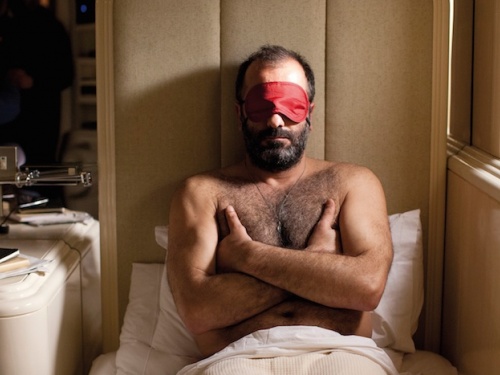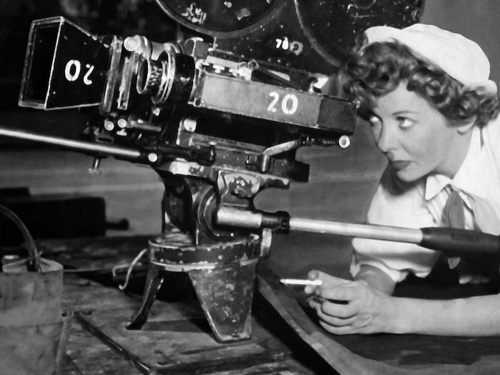The Politics of Looking: An Interview with Lorenzo Vigas
Ahead of our exclusive screening of From Afar on 30 June, followed by a Q&A, Maya Caspari caught up with director Lorenzo Vigas to hear about how he got into filmmaking, the inspiration behind the film and how he hopes the film will challenge perceptions of masculinity in Venezuela. This is an edited transcript of the conversation.
Winner of the Golden Lion for Best Film at the Venice Film Festival 2015, From Afar is a compelling and beautifully-shot story of the complex relationship between two men from different worlds.
What first drew you to filmmaking?
The first contact with film came through my father, a well-known painter. I used to hear him watching films late at night. He liked mystery films and sometimes good horror. I got hooked on them.
When I was 15, my parents gave me a VHS camera as a present, so I started making films with my friends from high school. We took it seriously but they were very bad, teenager films. I saw it as a hobby. I started studying biology but kept watching lots of films; I also very much liked photography. In my 20s, I started watching Ingmar Bergman – the first important filmmaker that I’d watched.
"I wanted to tell a story about someone unable to communicate - an outsider."
I also kept doing things with a camera. I made a documentary about one of my father’s shows in Paris and it got shown in Venezuela, so I began to think, "maybe I could make a living out of this". I was doing a Masters degree in molecular Biology in Boston and I felt something was going wrong with me. I like Biology but I had a need for expression that I knew wasn’t going to be fulfilled. I’m also one of those personalities that needs to take risks. So, one day I said, "I have to do something with a camera." I went down to New York, did a couple of Film and Video workshops at NYU and started working on a screenplay.
At the beginning, I was drawn in through an interest in the image, looking through the camera – maybe because I’m the son of an artist. But then I started watching more films and having ideas about telling stories. Those years in New York were very important because I finally felt I was doing what I wanted to do. I moved to Caracas, where I started directing documentaries – institutional documentaries and commercials, and started working with this story.
What prompted you to tell the story that you do in From Afar?
I wanted to tell a story about someone unable to communicate - an outsider. Someone with a fear of touching, of contact. Yet, I wasn’t sure about the whole story.
I became very close to Guillermo Arriaga. He was very moved by my story and wanted to help me do it. I had a friend who was murdered in Caracas, Guillermo had a friend who was murdered in Mexico - both in homophobic attacks. Those two friends inspired, or helped us, understand the character of Armando.
So, I decided to move to Mexico and I first shot my short film Elephants Never Forget. From Afar comes from this film and also from this idea about that character.
The film depicts the relationship between two very different men in a world where there are rigid ideas about masculinity and sexuality. To what extent did you seek to offer a political commentary through the film, and to challenge social expectations? How do you expect it to be received in Venezulela?
I think it is very political. But that was not my intention when writing the screenplay. I just wanted to tell a story about this character - a story that dealt with masculinity. I didn't know it was going to become such an amazing reflection - a mirror of what is happening not only in Venezuela, but also across the continent. In Latin America, there is this idea of a strong relationship between masculinity and power – the macho thing. In Venezuela we’re very loud, very physical and Elder is very Venezulean in that sense. Armando is like the other side of the mirror. So I had this guy Armando having a relationship with a very young and tough guy like Elder – a need for power. That was how the story started.
"The character of Armando works as a metaphor for Venezuela, because he’s someone who is unable to communicate emotionally with others."
Right now we’re having a crisis of communication in Venezuela. People from lower classes are not talking to people from the middle class. People from the middle class are not talking to people from the upper class. It’s like communication has been cut off - also the communication between the government and the people. In that way, the character of Armando works as a metaphor, because he’s someone who is unable to communicate emotionally with others.
The reaction to the film in Venezuela is going to be interesting. The film will premiere there on 1 September. I think it’s going to be very polemic. I just hope it will start some dialogue about these topics, at a moment when dialogue is so important in Venezuela.
There is an amazing chemistry between the two lead actors on screen. How did you go about the casting process?
I knew that a big challenge was finding the young actor to play Elder. I was very lucky. I spoke to a friend who has a casting agency and she showed me a picture of this young boy - Luis [Silva]. I met him, we started to get to know each other and I knew he was meant to be Elder. It had been his dream to be an actor since he was very young. Even though he didn’t know it, he was a natural. I didn’t want to immediately put a camera in front of him. I just wanted to become close to him - he had to trust me because he had to do strong scenes in the film. When the first day of shooting came, we saw the monitor and I knew I had found someone amazing and we were all very surprised by his power.
Alfredo Castro was my first choice for Armando because I think he’s the best actor working in Latin America. I didn’t know if he was going to accept because he picks up very few projects. But he loved the script so it was very easy to get him involved. He’s very active in the sense that he’s always changing the scenes and giving you ideas to improve them. So it was very important to have him in the project.
"Luis would get his lines 20 minutes before each scene."
On the other hand Luis didn’t know exactly what the story was about – I never showed him the script. He would get his lines 20 minutes before each scene. So he would be discovering the story every day. I didn’t want him to have an intellectual idea of his character.
I also didn’t want them to meet before the first day of shooting. I knew they were going to be very nervous – both of them. But I knew all the tension was going to be good for the film. And they became very close. We looked into the monitor and very soon realised that there was an amazing chemistry between them.
The film reflects on acts of looking, and the power of these acts. How did the way you chose to frame the film—your manipulation of perspective and depth of field—interact with your depiction the relationship between Elder and Armando, with its subtly shifting power balance and negotiation of emotional distance?
Absolutely, it's all about looking. But it wasn’t a rational process. It was very intuitive. I told the director of photography not to move the frame, to stay there and to be out of focus. It all came together in the editing.
I knew we had to often see Armando from his back and I knew his point of view was very important in terms of what he was looking at, and what he wasn’t able to see. The screen becomes like a window to his soul; it stays there and if something doesn’t happen in front of it, you cannot see it.
The whole film is basically Armando’s world. It’s a world that we see; the audience is always looking through his eyes. That’s why distance in [the framing of] the film, and the emotional distance it implies, is so important. It's about this guy who is always looking - from afar.
The film often draws our attention to what is outside the frame, what is unsaid. What was behind this? Do you hope to challenge the audience?
Yes, it’s a film where ambiguity is very important. It’s like the Mona Lisa - you never know her real reaction. Ambiguity is closer to real life. You’re never really sure about your emotions. You sometimes love your boyfriend, you sometimes hate him.
It also puts the audience in an active position. Art has lost that. Films were like that in the past. Now, in most films, the emotions are very clear and the information tells you everything. You don’t get the chance to pay an active part.
"What is important about art is not giving answers but making you ask questions."
From the moment this film starts, it’s always challenging the audience. That’s why some people also react to it in a negative way because they prefer to be in a very passive position and not to be challenged. But this film is different. What is important about art is not giving answers but making you ask questions. Some are easy to answer and some are not. ■
Director Lorenzo Vigas is in conversation with academic, critic and curator Maria Delgado following a special screening of the film on 30 June.
This article is posted in: Articles, Blog, Events, Film
Tagged with: From Afar, Desde Alla, Lorenzo Vigas, Sexuality, Masculinity, LGBTQ, Film, Films, Venezuela, Latin America, South America, politics, Art, Gender, Maya Caspari








